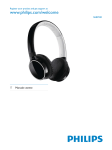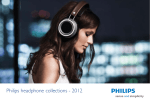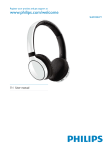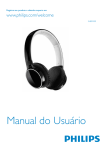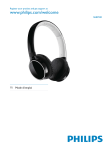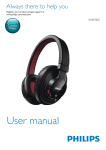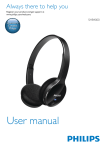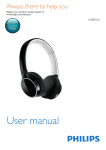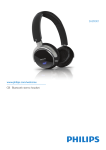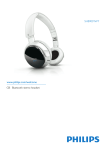Download Philips SHB9100
Transcript
Register your product and get support at www.philips.com/welcome SHB9100 EN User manual 1 Important Hearing Safety Electric-, Magnetic- and Electromagnetic Fields (EMF) General information Disposal of your old product Remove the integrated battery Notice for the European Union Notice for USA (FCC) Trademarks 4 4 4 4 5 5 5 5 6 2 Your bluetooth stereo headset Introduction What’s in the box What else you’ll need Compatibility 7 7 7 7 8 8 3 Get started 9 9 9 Overview of your Bluetooth stereo headset Charge the headset Pair the headset with your mobile phone 4 Use the headset 10 10 10 10 11 11 5 Technical data 12 6 Frequently asked questions 13 13 13 13 13 13 13 Connect the headset to a mobile phone Automatic power saving Use your headset Wear your headset Use with the audio cable Bluetooth headset does not switch on. No connection to a mobile phone. Pairing does not work. The mobile phone cannot find the headset. Voice dialing or redialing does not work. The other side cannot hear me. The headset is connected to a Bluetooth stereo enabled mobile phone, but music will play on the mobile phone’s speaker only. Audio quality is poor and crackling noises can be heard. Audio quality is poor when streaming from the mobile phone is very slow, or audio streaming does not work at all. I hear but cannot control music on my device (e.g. skip forward/backward). Headset does not work when audio cable is connected. Restore the factory setting 13 14 14 14 14 13 EN 3 English Contents 1 Important Hearing Safety 2. One of Philips’ leading Business Principles is to take all necessary health and safety measures for our products, to comply with all applicable legal requirements and to stay well within the EMF standards applicable at the time of producing products. 3. Philips is committed to develop, produce and market products that cause no adverse health effects. Danger •• To avoid hearing damage, limit the time you use the headphones at high volume and set the volume to a safe level. The louder the volume, the shorter is the safe listening time. Be sure to observe the following guidelines when using your headphones. • Listen at reasonable volumes for reasonable periods of time. • Be careful not to adjust the volume continuously upwards as your hearing adapts. • Do not turn up the volume so high that you can’t hear what’s around you. • You should use caution or temporarily discontinue use in potentially hazardous situations. • Excessive sound pressure from earphones and headphones can cause hearing loss. • Using this headset with both ears covered while driving is not recommended and may be illegal in some areas while driving. • For your safety, avoid distractions from music or phone calls while in traffic or other potentially dangerous environments. Electric-, Magnetic- and Electromagnetic Fields (EMF) 1. Royal Philips Electronics manufactures and sells many products targeted at consumers, which, like any electronic apparatus, in general have the ability to emit and receive electromagnetic signals. 4 EN 4. Philips confirms that if its products are handled properly for their intended use, they are safe to use according to scientific evidence available today. 5. Philips plays an active role in the development of international EMF and safety standards, enabling Philips to anticipate further developments in standardization for early integration in its products. General information To avoid damage or malfunction: • Do not expose the headset to excessive heat. • Do not drop your headset. • Apparatus shall not be exposed to dripping or splashing. • Do not allow your headset to be submerged in water. • Do not use any cleaning agents containing alcohol, ammonia, benzene, or abrasives. • If cleaning is required use a soft cloth, if necessary dampened with a minimum amount of water or diluted mild soap, to clean the product. About operating and storage temperatures • Do not operate or store in a place where temperature is below -15ºC (5ºF) or above 55ºC (131ºF) as this may shorten your battery life. • The integrated battery shall not be exposed to excessive heat such as sunshine, fire or the like. Your product is designed and manufactured with high quality materials and components, which can be recycled and reused. Remove the integrated battery English Disposal of your old product Warning •• Make sure the headset is disconnected from the USB charging cable before removing the battery. When this crossed-out wheeled bin symbol is attached to a product it means that the product is covered by the European Directive 2002/96/ EC. If there is no collection/recycling system for electronic products in your country, you can protect the environment by removing and recycling the battery before disposing the headset. Please inform yourself about the local separate collection system for electrical and electronic products. Please act according to your local rules and do not dispose of your old products with your normal household waste. Correct disposal of your old product helps to prevent potential negative consequences for the environment and human health. 1 2 3 4 Notice for the European Union Battery disposal Your product contains batteries covered by the European Directive 2006/66/EC, which cannot be disposed of with normal household waste. Hereby, Philips Consumer Lifestyle, BG Accessories, declares that this Philips Bluetooth stereo headset SHB9100 is in compliance with the essential requirements and other relevant provisions of Directive 1999/5/EC. Please inform yourself about the local rules on separate collection of batteries. The correct disposal of batteries helps prevent potentially negative consequences on the environment and human health. Notice for USA (FCC) This device complies with Part 15 of the FCC Rules. Operation is subject to the following two conditions: (1) this device may not cause harmful interference, and (2) this device must accept any interference received, including interference that may cause undesired operation. This equipment has been tested and found to comply with the limits for a Class B digital device, pursuant to part 15 of the FCC Rules. EN 5 These limits are designed to provide reasonable protection against harmful interference in a residential installation. This equipment generates, uses and can radiate radio frequency energy and, if not installed and used in accordance with the instruction manual, may cause harmful interference to radio communications. However, there is no guarantee that interference will not occur in a particular installation. If this equipment does cause harmful interference to radio or television reception, which can be determined by turning the equipment off and on, the user is encouraged to try to correct the interference by one or more of the following measures: • Relocate the receiving antenna. • Increase the separation between equipment and receiver. • Connect the equipment into an outlet on a circuit different from that to which the receiver is connected. • Consult the dealer or an experienced radio/TV technician for help. Warning •• Changes or modifications made to this equipment not expressly approved by Philips may void the FCC authorization to operate this equipment. Note •• FCC/IC Radiation Exposure Statement: This equipment complies with FCC/IC radiation exposure limits set forth for an uncontrolled environment. End users must follow the specific operating instructions for satisfying RF exposure compliance. •• This transmitter must not be co-located or operating in conjunction with any other antenna or transmitter. Philips Consumer Lifestyle A division of Philips Electronics North America Corporation P.O.Box 10313 Stamford, CT 06904 Phone: 1-888-PHILIPS (744-5477) 6 EN Trademarks Trademarks are the property of Koninklijke Philips Electronics N.V. or their respective owners. The Bluetooth word mark and logos are owned by the Bluetooth SIG, Inc. and any use of such marks by Koninklijke Philips Electronics N.V. is under license. Congratulations on your purchase, and welcome to Philips! To fully benefit from the support that Philips offers, register your product at www.philips.com/welcome. English 2 Your bluetooth stereo headset • e Introduction With the Philips Bluetooth stereo headset SHB9100, you can: • Enjoy convenient wireless hands-free call • Enjoy and control wireless music • Switch between calls and music • Enjoy music on non-Bluetooth devices with audio cable What’s in the box • Philips Bluetooth stereo headset SHB9100 Audio cable a b d c • Quick start guide What else you’ll need A mobile phone that is capable of Bluetooth stereo streaming, i.e. that is compatible with the Bluetooth A2DP profile. Other devices (Notebooks, PDA’s, Bluetooth adapters, MP3 players etc.) are also compatible if they share the Bluetooth profiles supported by the headsets. These profiles are: For wireless Hands-Free communication: • The Bluetooth Headset profiles (HSP) or the Bluetooth Hands-Free profile (HFP). For wireless stereo listening: • The Bluetooth Advanced Audio Distribution profile (A2DP). For wireless music control: • The Bluetooth Audio Video Remote Control profile (AVRCP). The headset features Bluetooth Version 2.1+EDR but will also work with devices featuring other Bluetooth versions that support the profiles above. • USB charging cable EN 7 Compatibility Your headset is compatible with Bluetooth enabled mobile phones. It features Bluetooth version 2.1+EDR. It also works with devices featuring other Bluetooth versions that support the Headset profile (HSP), Hands-Free profile (HFP), Advanced Audio Distribution profile (A2DP) and Audio/Video Remote Control profile (AVRCP). Overview of your Bluetooth stereo headset 8 EN Charge the headset 3 Press and hold until the LED starts breathing white and blue alternately. »» The headset is in pairing mode, which lasts five minutes. 4 Pair the headset with the mobile phone. For details, refer to the user manual of the mobile phone. Warning •• Before you use your headset for the first time, charge the battery for four hours for optimum battery capacity and lifetime. •• Use only the original USB charging cable to avoid any damage. •• Finish your call before charging the headset, as connecting the headset for charging will power off the unit. •• You can operate the headset normally during charge. A sample pairing is shown below. 1 2 3 Plug the headset into a powered USB port with USB charging cable. »» LED turns white during charge and turns off when the headset is fully charged. Under Bluetooth menu on the mobile phone, search for the headset. On mobile phones using Bluetooth 2.1+EDR or higher, you do not need to enter a pass code. From the found devices, select Philips SHB9100. • Enter “0000” (4 zeros), if prompted to enter the pin code of the headset. •• Typically, a full charge takes three hours. 10:36 10:35 Settings Tip English 3 Get started Connectivity Settings 10:37 Settings Bluetooth Devices Found Add Bluetooth device Philips SHB9100 SHB6000 Connectivity Enter Password **** 0000 Select Back Select Back Select Back Pair the headset with your mobile phone Before you use the headset with a mobile phone for the first time, pair it with the mobile phone. A successful pairing establishes a unique encrypted link between the headset and the mobile phone. The headset stores the last eight links in the memory. If you try to pair more than eight devices, the link for the earliest paired device is overwritten. 1 2 Ensure that the mobile phone is turned on and its Bluetooth feature is activated. Ensure that the headset is charged and turned off. EN 9 4 Use the headset Connect the headset to a mobile phone 1 2 Turn on your mobile phone. Press and hold to turn the headset on. »» The blue LED is on. »» The headset is reconnected to the last connected device automatically. If the last one is not available, the headset tries to reconnect to the penultimate connected device. Note •• If you turn the mobile phone on or its Bluetooth feature after turning the headset on, connect the headset from the Bluetooth menu on your mobile phone. Automatic power saving If the headset cannot find any Bluetooth device to connect to in range within five minutes, it powers down automatically to save the battery life. Use your headset Task Sound or LED Indicator Turn the headset Press and 1 short beep on. hold for - 3 white more than 4 flashes: Battery seconds low < 25% - 2 white flashes: Battery level < 50% - 1 blue flash: Battery level > 50% 10 Turn the headset Press and off. hold for more than 4 seconds Play or pause Tap music. Pick up or Tap terminate a call. Reject a call. Hold Redial the last number. Switch caller in a call. Transfer a call to your mobile phone. (This function is available if your mobile phone supports this feature.) Adjust volume. Skip forward. Skip backward. 1 short beep 1 short beep 1 short beep Double tap 1 short beep Double tap 1 long beep Hold for more than 4 seconds 1 long beep Slide up and 1 short beep down VOL +/Tap 1 short beep Double tap 1 short beep Mute/unmute Tap the microphone in a call. Activate voice Double tap dialing Operation EN - 1 long beep - 1 long white flash 1 short beep / 2 short beeps 2 short beeps before dial tone Other status and indicators Headset Status The headset is connected to a Bluetooth device, while the headset is in standby mode or while you are listening to music. The headset is ready for pairing. Indicator Blue LED flashes every 8 seconds. LED flashes whiteand bluealternately. Low battery. Battery is fully charged. Blue LED flashes fast. Blue LED flashes twice per second. White LED flashes. White LED is off. Use with the audio cable With the supplied audio cable, you can use the headset with non-Bluetooth enabled devices or use the headset on airplane. No battery power is required when you use the headset with the audio cable. Caution •• Finish your call before connecting the audio cable, as this will switch off battery power and end an incoming call. Wear your headset Adjust the headband for the best fit. Connect the supplied audio cable to • the headset and; • a music device. Tip •• After use, twist both earshells, fold the headset flat for storage. EN 11 English The headset is on but not connected to a Bluetooth device. There is an incoming call. 5 Technical data • • • • • • • Up to 9 hours of play time or talk time Up to 200 hours of standby time Typical time for a full charge: 3 hours Rechargeable Lithium-Polymer battery (230 mAh) 3.5 mm audio socket for corded headset mode Bluetooth 2.1+EDR, Bluetooth mono support (Headset Profile - HSP, HandsFree Profile - HFP), Bluetooth stereo supported (Advanced Audio Distribution Profile - A2DP; Audio Video Remote Control Profile - AVRCP) Operating range: Up to 15 meters (50 feet) Adjustable, flat-folding headband Noise isolating slow recovery foam Digital echo & noise reduction Auto power off Battery status check • • • • • Specifications are subject to change without notice. 12 EN Pairings may have been reset or headset has been previously paired with other device. • Pair the headset with the mobile phone again as described in the user manual. Bluetooth headset does not switch on. Voice dialing or redialing does not work. Battery is low. • Charge the headset. Your mobile phone may not support this feature. The audio cable is connected to the headset. • Disconnect the audio cable. No connection to a mobile phone. Bluetooth disabled. • Enable the Bluetooth feature on your mobile phone and turn on the mobile phone before you turn on the headset. Pairing does not work. The headset is not in pairing mode. • Follow the steps described in this user manual. • Ensure that the LED light flashes whiteand blue alternately before you release . Do not stop holding the button after seeing the blue LED only. The mobile phone cannot find the headset. The headset may be connected to another previously paired device. • Turn the currently connected device off or move it out of range. English 6 Frequently asked questions The other side cannot hear me. The microphone is muted. • Press to enable the microphone. The headset is connected to a Bluetooth stereo enabled mobile phone, but music will play on the mobile phone’s speaker only. The mobile phone may have the option to listen to music via speaker or headset. • Refer to the user manual of your mobile phone on how to transfer the music to the headset. Audio quality is poor and crackling noises can be heard. The Bluetooth audio source is out of range. • Reduce the distance between the headset and the Bluetooth audio source, or remove obstacles between them. EN 13 Audio quality is poor when streaming from the mobile phone is very slow, or audio streaming does not work at all. The mobile phone may only support (mono) HSP/HFP but not support A2DP. • Refer to the user manual of the mobile phone for detailed information on compatibility. I hear but cannot control music on my device (e.g. skip forward/backward). The Bluetooth audio source does not support AVRCP. • Refer to the user manual of the audio source for detailed information on compatibility. Headset does not work when audio cable is connected. Mic function will be deactivated if 3.5mm audio cable is connected to the headphone. • In such case, the headphone is only for music enjoyment. Restore the factory setting Restore all original headset setting. • Press and until the LED flashing white for 5 times sequentially. Please visit www.philips.com/welcome for further support. 14 Philips Consumer Lifestyle AQ95-56F-1300KR 2011 ........................................................ (Report No. / Numéro du Rapport) ........................................................................... (Year in which the CE mark is affixed / Année au cours de laquelle le marquage CE a été apposé) EC DECLARATION OF CONFORMITY (DECLARATION DE CONFORMITE CE) We / Nous, PHILIPS CONSUMER LIFESTYLE B.V. (Name / Nom de l’entreprise) TUSSENDIEPEN 4, 9206 AD DRACHTEN, THE NETHERLANDS (address / adresse) Declare under our responsibility that the electrical product(s): (Déclarons sous notre propre responsabilité que le(s) produit(s) électrique(s):) PHILIPS ....................................................................... (brand name, nom de la marque) SHB6017, SHB6017/XX (where xx=00 to 99) ........................................................... (Type version or model, référence ou modèle) _ Bluetooth Stereo Headset .............................................................................................. (product description, description du produit) To which this declaration relates is in conformity with the following harmonized standards: (Auquel cette déclaration se rapporte, est conforme aux normes harmonisées suivantes) _ (title, number and date of issue of the standard / titre, numéro et date de parution de la norme) EN 300 328 V1.7.1:2006 EN 301 489-1 V1.8.1:2008; EN 301 489-17 V1.3.2:2008 EN 50371:2002 EN 60950-1:2006/A11:2009 _ Following the provisions of : (Conformément aux exigences essentielles et autres dispositions pertinentes de:) 1999/5/EC (R&TTE Directive) (Directive R&TTE 1999/5/CE) And are produced under a quality scheme at least in conformity with ISO 9001 or CENELEC Permanent Documents (Et sont fabriqués conformément à une qualité au moins conforme à la norme ISO 9001 ou aux Documents Permanents CENELEC) SGS 2150 Notified Body Opinon The Notified Body ....................................................... performed ............................................... (L’Organisme Notifié) (Name and number/ nom et numéro) (a effectué) ZD02H0004 (description of intervention / description de l’intervention) And issued the certificate, ................................................................. (et a délivré le certificat) (certificate number / numéro du certificat) Remarks: (Remarques:) Drachten, The Netherlands, Jan. 03, 2011 ........................................................... (place,date / lieu, date) Philips Consumer Lifystyle A.Speelman, CL Compliance Manager ............................................................................................ (signature, name and function / signature, nom et fonction) AMB 544-9056 © 2011 Koninklijke Philips Electronics N.V. All rights reserved. SHB9100_UM_00_V1.0















